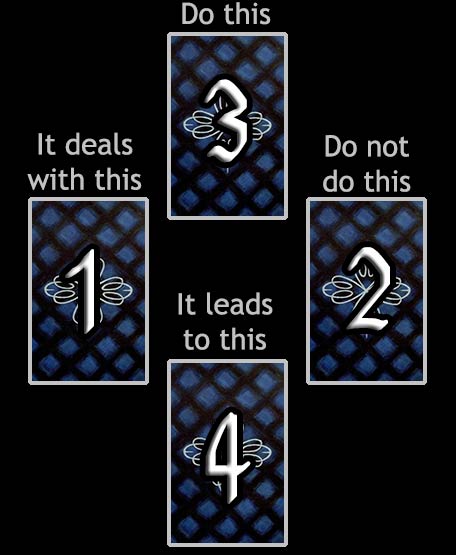Cross Spread

Difficulty: Easy
The Cross Spread is good for questions asking for advice. It can also be used to determine the meaning of a confusing card from a previous reading, or for that matter, to shed light on other points of confusion.
In questions asking advice, this tarot spread is self-explanatory. The main thing is to determine the difference between cards #2 and #3. #1 is the topic and #4 is the result.
In questions regarding confusion, such as: "What was the meaning of Card (X) in the last spread?" the main thing is also to determine the difference between cards #2 and #3. In this case, #2 will show what the card was not referring to, and Card #3 will show what was really meant. Card #1 is the topic and #4 represents the purpose it serves.
Your Cross Reading
DO This The Wheel of Fortune |
||
It Deals with This The Hermit |
Do NOT Do This Strength |
|
It Leads to This Temperance |

It Deals with This
The Hermit
The picture is kept fairly dark. The only light can be found in the star and the house. The moon, which does not shine itself, shows the occupation with the subconscious and the concealed which have to be discovered. The star shines itself, but is still too far away. It is the star the Hermit will follow as soon as he leaves the house. It is five-pointed, which forms a connection with the Hierophant's theme.
The picture's spirals in the trees, path and window turn in different directions and refer to the inward course. This can be consciously taken, turning to the right, or intuitively, turning to the left. The Hermit finds his light in the safety of the house. The fish (newly discovered emotions) are waiting outside for him. The direction of the path, which again follows outwardly, is not clearly evident. One can suspect strong emotions in the background, portrayed by moving water.

Do NOT Do This
Strength
A sceptre and a sword seem to be fighting. Water and fire, portrayed in striking red, stand for subconscious strength. They are kept under control by the symbols of earth and air, the conscious elements, portrayed by the sword (clarity), the house (stability) and the wall (limits, firmness). The violet colour of the wall also shows a penetration of the colours red and blue.
The trees also contain this mixture of the elements, but they are growing cautiously as well as the clouds, water, which so to speak, becomes air (gaseous). They also stand for integration, which on the one hand makes us more flexible but on the other hand obscures things. The lemniscates, which can be seen clearly in magic, can be found in the two trees in the top left corner. It illustrates swinging into the next bend.

DO This
The Wheel of Fortune
In the middle of the diagram three discs can be seen. I often use the number three in the descriptions as a basic universal number. The inner disc is blank. On the second disc we can make out the hourly Roman numerals. They appear anticlockwise to show that time's direction is relative.
The signs of the zodiac on the outer disc show a further meaning for the course of time. Around these discs or rings, as though one could present them how one liked, the four elements are arranged. They seem to be rotating and moving in a circle from light into dark and back again.

It Leads to This
Temperance
The path through the underworld can be seen which eventually leads into light. The path is edged with lilies, the underworld flowers. The abstract archangel Michael is helping to find the right composition for the flow of energy, in other words is on the way through the subconscious (forgotten) to keep a minimal contact going with the conscious e.g., by transmission (documents...)
